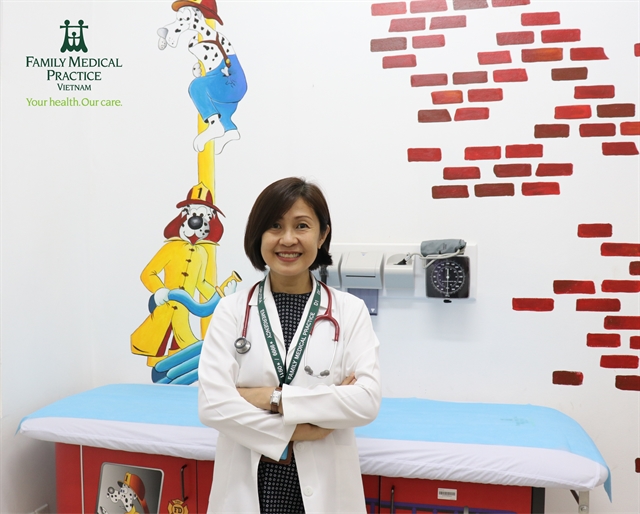 Life & Style
Life & Style


|
| Dr. Sheila Rodriguez. — Photo courtesy of Family Medical Practice |
by Dr. Sheila Rodriguez*
What Is Dengue fever and what causes it?
Dengue fever is a flu-like illness caused by one of the serotypes (DEN-1, DEN-2, DEN-3 or DEN-4) from the Flaviviridae family, and is transmitted by a female mosquito from the Aedes aegypti species. Persons who harbour the virus may or may not be symptomatic with most cases being mild and resolving on their own.
Where can it be found?
The dengue virus is found in countries with rainfall, high humidity and temperate climates because these conditions favour mosquito breeding and survival. As of 2010, 70 per cent of infections came from Asia and 14 per cent came from the Americas. More cases are also seen due to unplanned rapid urbanization which leads to high population density, poverty and poor infrastructure, specifically in water and waste management. Eggs remain viable for several months and hatch when in contact with water.
How is Dengue virus transmitted?
The virus is not spread directly from person to person, but through a mosquito bite. Once a female Aedes aegypti bites someone with the virus the mosquito transmits by biting and injecting it onto another. Transmission from one person to another begins 2 days before until 2 days after symptoms are seen. Once the virus undergoes incubation inside the mosquito, the mosquito is capable of transmitting it for the rest of its life. The Aedes aegypti has evolved into an intermittent biter (more than one person at a time) such that it is now considered a highly efficient epidemic vector.
Who gets Dengue? What are the symptoms?
According to one Asian study children between 3-12 years old are mostly affected, although it can occur as young as 1 up to 16 years old. Symptoms of dengue include high fever of 40°C/104°F, severe headache, nausea, vomiting, pain behind the eyes and in the muscles and joints, swollen glands and a rash. Mild symptoms usually last 2–7 days; however if the infection doesn't clear when expected or the patient presents with warning signs below, it is imperative to bring to the pediatrician right away.
What are the warning signs?
3–7 days after the first symptoms appear, dengue fever lyses to below 38°C/100°F. The succeeding 24-48 hours are critical; warning signs include severe abdominal pain, persistent vomiting, rapid breathing, nose or gum bleeding, fatigue, restlessness and blood in vomit or stools. Note that not all dengue fevers are fatal but if your child has any of the above symptoms along with at least 3 days fever, you need to bring them to a doctor. Early and proper medical care is needed to avoid complications and risk of death.
How Is Dengue fever diagnosed?
PCR is a molecular test recommended by WHO during the first 5-6 days of illness; it is currently the only method which identifies the specific DENV serotype during acute disease.
Dengue NS1 antigen test is another early and rapid method. Ordering a dengue NS1 assay within the first week of illness is one of the initial investigations recommended by the Ministry of Health, Singapore.
Dengue IgM and IgG tests detect antibodies in a person exposed to the virus, but are most accurate when performed 5 days after exposure.
Complete blood count (CBC) may show an increased hematocrit indicating fluid loss, or a decrease in platelet count which may lead to further blood loss.
How is Dengue fever treated?
Paracetamol eases the headaches and pains associated with dengue fever. Aspirin or ibuprofen should be avoided because they decrease the platelet count which makes bleeding more likely.
Mild degnue is managed at home but severe dengue is critical for which hospitalisation and close monitoring are necessary.
Can one get another episode of Dengue?
Recovery from infection by one provides lifelong immunity against that particular DENV serotype. However, persons may still be infected by any of the other three, and the risk of severe dengue likewise increases with succeeding episodes.
Is there a Dengue vaccine?
The live attenuated Dengvaxia® proved efficacious and safe when given to persons who had Dengue in the past; however, it carries an increased risk of severe illness in those who have not had a previous infection. Hence only persons with laboratory-confirmed past dengue infections should be vaccinated.
How else can Dengue fever be prevented?
The Aedes aegypti mosquito lives in urban habitats and breeds in man-made containers. Standing water from rubber tires, buckets, planters, toys, pools, birdbaths, flower pots or saucers should be inspected. These with trash containers in and around your home should be regularly emptied, scrubbed, turned over or covered if not thrown away.
The 2 peak feeding periods for this mosquito are early morning and early evening before dusk. The use of window screens, insect repellents and insecticide sprays as well as wearing long-sleeved clothing serve as protective measures against bites. According to the US EPA the following are safe for topical use even during pregnancy or breastfeeding: DEET, Picaridin (known as KBR 3023 and icaridin outside the US), IR3535, Oil of lemon eucalyptus (OLE), Para-menthane-diol (PMD), 2-undecanone. — Family Medical Practice
*After the medical boards Dr. Sheila Rodriguezspent a year in the US, dabbled in Internal Medicine, Dermatology and Pathology before finally specialising in Pediatrics. The cumulative experience with medical school at the UERM and internship at the Medical City General Hospital, proved indelible.
In the last year of training she was sole resident, topped consortium exams and hospital-wide research competitions. Infectious disease, Preventive Health, Pediatric nutrition, development and behavior, Counseling and Child psychology are her main interests.
For more information or medical advice, please contact
Family Medical Practice Hanoi at: at 298 I Kim Mã Street, Ba Đình. Tel: (024) 3843 0748. E: hanoi@vietnammedicalpractice.com.
Family Medical Practice’s downtown Hồ Chi Minh clinics are located at Diamond Plaza, 34 Lê Duẩn, District 1 and at 95 Thảo Điền Street, District 2. Tel: (028) 38227848. E: hcmc@vietnammedicalpractice.com.
FMP Danang is located at 96-98 Nguyễn Văn Linh Street, Hải Châu District, Đà Nẵng. Tel: (0236) 3582 699. E: danang@vietnammedicalpractice.com.



